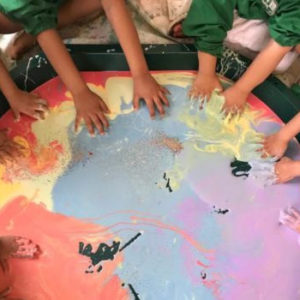From birth, children are constantly exploring their senses and processing new information. Sensory play is a valuable way of engaging children in activities that enriches their learning. Children are naturally curious and using their senses is one of the most innate ways for them to learn about the world around them.
When discussing senses, we often tend to think of the ‘big five’: sight, touch, taste, hearing and smell. While these five senses play a critical role in a child’s development, there are others that are just as important to nurture too. These are the sense of balance and movement and the sense of body position. By providing little ones with a variety of play-based sensory opportunities, we are supporting their brain development, cognitive growth, gross and fine motor skill development and so much more.
The Benefits of Sensory Play:
- Builds Nerve Connections
The period from birth to five years is when children’s brains grow the fastest. They are constantly learning and developing neural connections. Research shows when children are actively using their senses in conjunction with another, they are continually building pathways between the nerves in their brain. Exposing children to various sensory experiences allows for their young brains to develop the necessary sensory processing skills. If children aren’t making and using these connections regularly, they simply lose them. This is precisely why sensory play is so important for young children’s development and it is these connections that enable them to become effective learners later in life.
- Enhances Language Skills
While exploring new tastes, smells and textures through sensory play, children learn and discover new ways to describe objects that are found in the world around them. For example, a rock starts to become so much more than just a rock once they have felt and explored it – The rock can now be smooth or rough, light or heavy! Foods begin to be described as sweet, salty, spicy or crunchy.
- Cognitive Development
Children’s first experiences while learning new concepts is via their senses. Each time they encounter something that is wet or sticky, it reinforces their understanding of which types of objects typically have similar characteristics. It is through this that children begin to form connections between things that have similar properties.
- Improves Social Skills
While partaking in sensory play with their peers, children observe how others are playing with the same material in a different way. Sensory play provides children with the opportunity to work together to discover new ways to shape, move, hold or manipulate an object.
- Strengthening Fine Motor Skills
Sensory play activities often involve touching, pouring, pinching, sorting and moving actions. Children primarily use their hands to explore, and in doing so, they strengthen their fine motor skills, which will later be used for writing.
Here is one of our favourite sensory play recipes that you can try at home with your child. We love gloop because it is so easy to make and children can’t seem to get enough of it!
Gloop –
You will need:
- 2 cups of cornflour
- 1 cup of water
- two drops of food dye
- A large container.
Encourage your child to mix and play with the gloop before it is completely mixed together. Explore the texture and talk about what it feels like -sticky, slimy, cold and powdery – let the fun begin!

